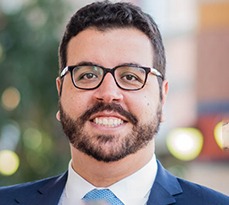We meet an MBA alumnus working in this sector and hear how their MBA learnings and skills led them into a career in the healthcare sector. We also hear from industry experts about what is involved to do well in this sector.
The industry expert – Tony Dutton

Executive coach and strategic and operational business consultant with experience of delivering revenue and profit growth across healthcare and consumer markets, Tony gives specialist career coaching to Cambridge MBA students.
What kind of careers are there in this sector and what kind of skills are needed?
Careers range from within big pharma like Johnson & Johnson, GSK and Pfizer to biotech and medtech – from Novo Nordisk to Siemens and GE. It covers strategy cConsulting with the giants McKinsey or BCG to boutique consulting with specialist firms Kinapse or ZS. There is also the private health sector covering Bupa and HCA. Finally, there are the VCs and private equity players covering healthcare, for example, Phase4 Partners, Rosetta Capital and 3i.
Roles in this sector range from product and commercial management positions, to business development and licensing. Project and financial management skills are key drivers, along with consulting and general business management skills.
Entrepreneurship opportunities exist across the sector in particular in areas, such as patient access, and big data includes technical solutions for systems and business development to new products and pharmaceuticals. The public sector roles cover hospital management and policy development.
One only has to look at the response to the COVID-19 pandemic to see how this sector is embracing change at an incredible rate and is requiring analytical skills, digital innovators, strategic mindsets and an ability to adapt and be agile.
What makes healthcare such an attractive sector?
Healthcare is one industry sector whose products and services we can be sure we will all make use of, whether we want to or not. There are ever more people, they are ever older, and the world is growing wealthier by the day as more developing countries enter that middle income bracket. As those countries become wealthier, they have a greater demand for healthcare.
Healthcare and its convergence with technology is an extremely exciting prospect for candidates looking to switch or redirect their careers. If we look at biotechnology, companies seeking medical breakthroughs, which could be new medicines or ways to improve the practice of medicine, this is a sector ripe for innovation.
What steps can I take into this sector and how can an MBA help?
MBA leadership programmes do still exist, although these are limited and fewer are available, such as the GSK Esprit programme and Roche’s Perspectives.
The practical projects run across the Cambridge MBA year such as the Cambridge Venture Project and the Global Consulting Project can provide invaluable healthcare sector experience and insights for those seeking to pursue a career in this sector. Internships also support that career journey, as we see with alumni Marcelo below.
Do I need a healthcare background?
Not necessarily but it is certainly helpful. It is vital that you show the passion and commitment to enter that field and have a powerful answer to the question why this is the career choice for you.
This is how an MBA at a big pharma company spoke of his reason for switching to healthcare:
“One of my career ambitions was to work for a company that makes a difference to people’s lives on a daily basis. It’s so rewarding and fulfilling when you see a patient whose quality of life has improved because of the work you’re doing.”
Marcelo’s story

Stepping out of strategy consultancy in health and crossing over to directly influence the healthcare industry from the inside, Marcelo Mangueira (MBA 2018) is now Business Development Manager at Ada Health, based in London, UK.
What ambitions did you have to work in this sector before starting your MBA?
Before joining the Cambridge MBA, I was a strategy consultant working on projects in the healthcare industry. These experiences gave me a first glimpse of the numerous challenges facing the sector and of what kind of career I could have if I switched industries. Eventually, I understood I could contribute more to addressing the challenges of the industry as an insider rather than being a consultant.
What attracted you to an MBA to support your move into this industry?
I felt an MBA would enable me to open doors and make connections in the industry which I wouldn’t have made otherwise, enabling an easier transition into the healthcare sector. I was also attracted by the high percentage of students who changed location after the Cambridge MBA, as I intended to stay in the UK.
What steps did you then take during your MBA and soon after as you stepped into your new role in this sector?
Doing my MBA Global Consulting Project for a health tech start-up was key to opening my eyes to the opportunities in the digital healthcare space in the UK. I decided to use the Summer Term to develop a research paper focused on how the NHS should reform its payment systems to incentivise the adoption of artificial intelligence and machine learning across the NHS.
My MBA research paper led me to interview several people in the sector – academia, NHS, and UK-based start-ups, of which Ada was one. After the research project conclusion, I shared an executive summary of my paper with those whom I had interviewed. This led to an offer for an internship at Ada after my MBA and later dovetailed into a full-time position in early 2020.
What MBA skills and learnings have you been using while working in this sector?
I realised all the learnings and discussions from the MBA’s Management Praxis course are even more insightful when you join a new company and a new role, especially acknowledging “my world is not your world” and navigating the group development stages in real life. In terms of more specific skills, as I have joined the Business Development team at Ada and I am constantly dealing with clients, I use a lot of the techniques and lessons learned in the negotiations classes in Management Praxis with faculty member Professor Mark de Rond. Some of the learnings from our Strategic Pricing class were also very helpful in the development of the company’s new pricing framework.
Where do you see your post-MBA career taking you in this sector in the near future?
Amid all the global disruption and pain, the pandemic has acted as a strong tailwind for healthtech companies, with telehealth providers being especially favoured over recent months. Online consultations would be considered an innovation two years ago, now they are the minimum requirement to start a purchase (table stakes). New technologies will continue to arise and change how healthcare is delivered. My ambition is to be in a leadership position in those companies that are at the forefront of these upcoming changes.


